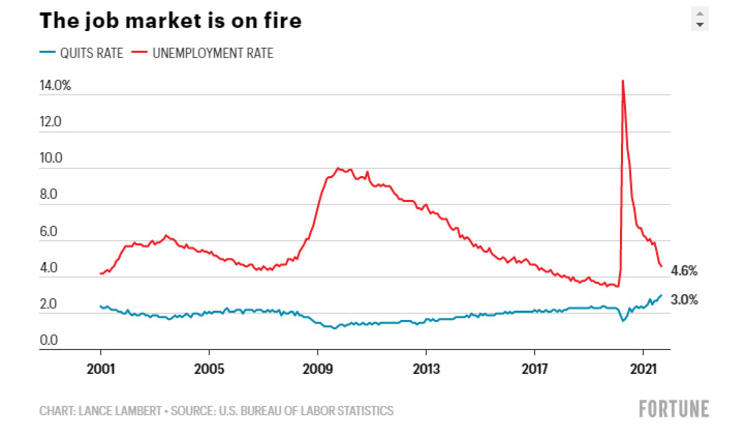Sustainable and Responsible Investing
The Great Resignation: the social challenge for companies

Sustainable and Responsible Investing

Coined in 2021 in the United States by Anthony Klotz, a professor of organisational psychology, the term refers to a large-scale protest movement by employees concerning their jobs, resulting in a massive wave of resignations and major strikes. This phenomenon, which reflects a widespread lack of social well-being, exacerbated by months of pandemic, is becoming the principal social issue for companies. Not addressing it would be risky.
Employment crises are not new. However, unlike previous crises in history —which were primarily economic in origin, putting millions of people out of work—, the current period is rather favourable for job seekers, in practically all industry sectors. The US unemployment rate has fallen to a record low in recent months (3.9% in December 2021). What is the extent of these departures? Since the spring of 2021, millions of Americans have been leaving their jobs each month without necessarily having the security of a new job (the progress made in managing Covid has reassured many). According to Bureau of Labor Statistics figures, 38 million Americans left their jobs in 2021 (out of a total of 162 million jobs). The month of November alone saw some 4.5 million employees leave the workforce.

This trend is less spectacular in Switzerland or France, which have a less “fluid” labour market, but it is nevertheless present, particularly in sectors heavily impacted by the effects of Covid (health, catering, and tourism). Many Swiss nursing staff, particularly nurses and care assistants, have thrown in the towel in recent months, exhausted by months of intensive commitment. Another significant phenomenon in recent months has been the proliferation of mass strikes in the United States within companies that are not well known for their defence of trade union liberty. Kellogg’s 1,400 employees have been protesting for months against excessive working hours during the peak of the pandemic, the deterioration of earnings (salaries and pensions), but also simply against the lack of recognition shown by the company.
Of course, the prospect of better pay conditions elsewhere is a major reason for these mass desertions. This is particularly true for the most fragile employees who have fought on the front lines against Covid, in precarious jobs, considered to be low-skilled. Many former hospitality workers, for example, now work for giants such as Amazon or Walmart, still in low-skilled and difficult jobs, but (only slightly) better paid and more stable given the demand for consumer goods. In September 2021, Amazon announced its intention to increase its hourly wage to $18. Other reasons mentioned in the surveys, apart from salary, include lack of health protection or stress leading to burnout. For white-collar workers, the key factors are the need for more flexibility and concrete development opportunities.

As one can see from this graph, the problems experienced at work vary according to levels of qualifications, sector and age. Contrary to the boomers, the representatives of generation Z clearly express other motivations than salary and the traditional search for power within a company. It is essential that companies seize upon these new aspirations and completely revise an organisational model that was already being questioned before the arrival of Covid. Surveys, such as the one conducted by McKinsey in September 2021, reveal discrepancies between the real aspirations of employees and those that employers often falsely attribute to their staff members. The search for meaning in work, flexibility in the way work is done (fewer fixed hours, the possibility of working remotely), the valuing of work by the employer, as well as the ethics and values of the organisation they work for have become essential to strengthen loyalty. New initiatives are all the more necessary as the shortage, be it of labour or “talent”, will cost companies dearly, both financially and in terms of reputation.
Diese Veröffentlichung wurde von Mirabaud erstellt. Sie ist nicht zur Verteilung, Verbreitung, Veröffentlichung oder Nutzung in einer Gerichtsbarkeit bestimmt, in der eine solche Verteilung, Verbreitung, Veröffentlichung oder Nutzung untersagt wäre. Sie ist nicht für Personen oder Unternehmen bestimmt, an die die Übersendung dieser Veröffentlichung rechtswidrig wäre.
Mehr lesen
Weiter zu
